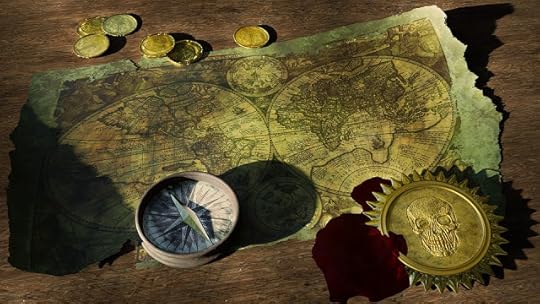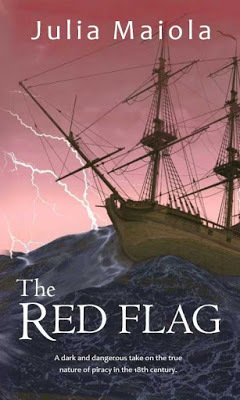Pirates: Lovable scoundrels, or cut-throat villains? by Julia Maiola #amwriting #Pirates #history @CaptainMaiola
Pirates: Lovable scoundrels, or cut-throat villains?
By Julia Maiola

What would a villain have to do to lose support from a sympathetic audience?
We as humans have a love for the underdog, for the misunderstood hero. We look to the Golden Age of Piracy for adventure, romance, and treasure. We root for the small thieves, the soul-tortured swashbucklers, and cheer when they do the right thing or grow a heart. Pirates were just trying to live a better life, after all, and weren’t real villains.
Or were they?
When I started The Red Flag, I had one goal in mind: to give readers the truth. Pirates were some of the cruelest people who ever lived. And they enjoyed being cruel.
We know that pirates were criminals. Yet we dress like them, talk like them, make exciting movies about them. As I myself got caught up in this popular culture, I started to wonder why there seemed to be such a celebration of these murderers and thieves. My research turned to myths vs. facts, and I realized that not only was there this strange interest and infatuation with piracy, but that the pop culture surrounding it was wrong. People aren’t dressing as murderers, but treasure-hunters. Not thieves, but hopeless romantics. Everything I saw in pop culture had nothing to do with pirates at all. This popular image had influenced people’s perception of pirates to the point of changing how they view them. So I decided to write a story about pirates that accurately portrayed the real rogues of the sea as they truly lived three hundred years ago.
I wanted to give readers a detailed depiction of what pirates were like and what sent them on this path of violence. I created a pirate captain, Stephen Boswell, who is motivated by fear in order to push him to do things that will shock and abhor readers. This is no adventure, and the motivation is no treasure. This is a dangerous, deadly voyage in which each kill is simply another day and each day still alive is a success.
Having created Stephen, I needed a character to completely contrast him, to be at odds with his evil, to give readers two sides of the same story, as far from each other as possible. Who better than Alice Bradford, a child, the epitome of innocence and naive goodwill. While Alice experiences the violence of the pirates firsthand, it is Stephen Boswell’s own recounting of what led him to this life that may draw the reader to his side. I think we subconsciously come to sympathize with those whose perspective we share, and I took advantage of this by putting Stephen’s accounts in the first person. My hope was to confuse readers over who to ultimately root for. On the one hand is little Alice who we want to protect from the villainous pirates. On the other is Stephen who shares his own experiences of being mistreated by the hypocritically villainous nature of the British navy. Readers will know and agree that Stephen is the villain, but they will wonder, and maybe even hope, if he can conquer his fears and escape the navy for good.
This was a deliberate effort on my part because while I wanted to expose the true nature of piracy, I also wanted to raise questions about human nature itself, both in the pirate characters and in the readers. Despite Stephen’s actions, we as humans want to see another human succeed, even as Stephen acts against other humans despite his own humanity.
But what would a villain have to do to lose support from a sympathetic audience?
What line would have to be crossed? That is, if the simple act of being a pirate didn’t mean he had already crossed it. For as I hope readers will come to understand as they read The Red Flag, pirates may have been humans, but they committed atrocities against their fellow humans. They were true villains, and not the swashbucklers that pop culture has come to idealize.
The Red Flag
 Captain Stephen Boswell sails under the red flag, a symbol of no mercy. It’s the only reason he has lived this long. The only reason the navy has not found him yet. But they are closing in. And if they catch him, they will execute him for piracy.
Captain Stephen Boswell sails under the red flag, a symbol of no mercy. It’s the only reason he has lived this long. The only reason the navy has not found him yet. But they are closing in. And if they catch him, they will execute him for piracy.Ten-year-old Alice Bradford doesn’t know why she is alive. When Captain Boswell found her hiding on his ship, she expected him to kill her, and it seemed his own crew had expected likewise. But now she is his prisoner and she fears that she will be forever. Somehow, though, it seems that the captain might be more afraid of the navy than she is of him. Something from his past has him ill at ease, Alice realizes. Even if the navy cannot bring him to his knees, his own paranoia will.
Amazon UK • Amazon US
Julia Maiola
 Julia Maiola is a professional ice cream scooper from Rochester, New York. She will receive her Bachelor’s in English at the end of 2018 and will continue to develop her writing. The Red Flag is her first novel, the first of many to come. A science fiction title is currently in the works and will be followed by more in the fantasy and historical fiction genres. When Julia is not writing, she is gaming and skateboarding, but most of her spare time is spent reading adventure novels.
Julia Maiola is a professional ice cream scooper from Rochester, New York. She will receive her Bachelor’s in English at the end of 2018 and will continue to develop her writing. The Red Flag is her first novel, the first of many to come. A science fiction title is currently in the works and will be followed by more in the fantasy and historical fiction genres. When Julia is not writing, she is gaming and skateboarding, but most of her spare time is spent reading adventure novels.Julia loves to hear from readers, you can find her: Website • Twitter • Goodreads• Facebook • Instagram
Published on November 29, 2018 23:00
No comments have been added yet.
The Coffee Pot Book Club
The Coffee Pot Book Club (formally Myths, Legends, Books, and Coffee Pots) was founded in 2015. Our goal was to create a platform that would help Historical Fiction, Historical Romance and Historical
The Coffee Pot Book Club (formally Myths, Legends, Books, and Coffee Pots) was founded in 2015. Our goal was to create a platform that would help Historical Fiction, Historical Romance and Historical Fantasy authors promote their books and find that sometimes elusive audience. The Coffee Pot Book Club soon became the place for readers to meet new authors (both traditionally published and independently) and discover their fabulous books.
...more
...more
- Mary Anne Yarde's profile
- 159 followers



